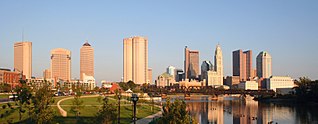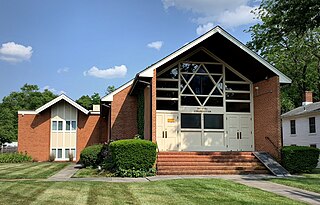
The Orthodox Union is one of the largest Orthodox Jewish organizations in the United States. Founded in 1898, the OU supports a network of synagogues, youth programs, Jewish and Religious Zionist advocacy programs, programs for the disabled, localized religious study programs, and international units with locations in Israel and formerly in Ukraine. The OU maintains a kosher certification service, whose circled-U hechsher symbol, U+24CAⓊCIRCLED LATIN CAPITAL LETTER U, is found on the labels of many kosher commercial and consumer food products.
The National Council of Young Israel (NCYI) or Young Israel, is a synagogue-based Orthodox Judaism organization in the United States with a network of affiliated "Young Israel" synagogues. Young Israel was founded in 1912, in its earliest form, by a group of 15 young Jews on the Lower East Side of Manhattan. Their goal was to make Orthodox Judaism more relevant to young Americanized Jews at a time when a significant Jewish education was rare, and most Orthodox institutions were Yiddish-speaking and oriented to an older, European Jewish demographic.

Beth Hamedrash Hagodol is an Orthodox Jewish congregation that for over 120 years was located in a historic building at 60–64 Norfolk Street between Grand and Broome Streets in the Lower East Side neighborhood of Manhattan, New York City. It was the first Eastern European congregation founded in New York City and the oldest Russian Jewish Orthodox congregation in the United States.
Magen Tzedek, originally known as Hekhsher Tzedek, is a complementary certification for kosher food produced in the United States in a way that meets Jewish Halakhic (legal) standards for workers, consumers, animals, and the environment, as understood by Conservative Judaism. Magen Tzedek certification is not a kashrut certification which certifies that food is kosher in that it meets certain requirements regarding ingredients of food and technical methods of animal slaughter, but an ethical certification complementary to conventional kosher certification.
Adath Jeshurun Congregation is a Conservative synagogue located in Minnetonka, Minnesota, in the United States, with about 1,200 members. Founded in 1884, it is a founding member of the United Synagogue of America, a founding member of the Women's League for Conservative Judaism, and the oldest affiliate of the United Synagogue of Conservative Judaism west of Chicago.

Congregation Beth Jacob is a Conservative Jewish synagogue located at 2401 Avenue K, Galveston, on Galveston Island, Texas, in the United States. The present synagogue was built by Austrian, Russian and Hungarian immigrants in 1931. It was listed on the National Register of Historic Places in 2024.
The Park Synagogue is a Conservative synagogue located at 27500 Shaker Boulevard, Pepper Pike, Cleveland, Ohio, in the United States.

Kahal Kadosh Beth Elohim is a Reform Jewish congregation and synagogue located in Charleston, South Carolina, in the United States.

Beth Israel Congregation is a Conservative synagogue located at 265 North Avenue in Washington, Pennsylvania, in the United States. Founded in 1891, it was the first Jewish congregation in Washington County. Its first rabbi, Jacob Goldfarb, served for 50 years.
Congregation Am Tikvah is a combined Conservative and Reform Jewish congregation and synagogue located at 625 Brotherhood Way in San Francisco, California, in the United States. The congregation was formed in 2021 as the result of the merger of the Conservative B'nai Emunah and the Reform Beth Israel Judea congregations, with the latter formed in 1969 through a merger of the Conservative Congregation Beth Israel and the Reform Temple Judea. The congregation is affiliated with both the Union for Reform Judaism and the United Synagogue of Conservative Judaism.
Beth Shalom B'nai Zaken Ethiopian Hebrew Congregation, more commonly known as Beth Shalom B'Nai Zaken EHC, or simply Beth Shalom, abbreviated as BSBZ EHC, is a Black Hebrew Israelite congregation and synagogue, located at 6601 South Kedzie Avenue, in Chicago, Illinois, in the United States. The congregation is led by rabbi Capers Funnye; and assistant rabbis are Avraham Ben Israel and Joshua V. Salter. Beth Shalom is affiliated with the International Israelite Board of Rabbis.

Congregation Beth Jacob Ohev Sholom is an Orthodox Jewish synagogue located at 284 Rodney Street in Williamsburg, Brooklyn, in New York City, New York, United States. The congregation follows the Ashkenazi rite.
Ilan Daniel Feldman is an American Orthodox Jewish rabbi, public speaker and author. Since 1991 he has been the senior rabbi and spiritual leader of Congregation Beth Jacob of Atlanta, Georgia, succeeding his father, Emanuel Feldman, who founded and led the congregation for 39 years. Feldman brought a community kollel to the city. He is also a founding board member of the Association for Jewish Outreach Programs (AJOP).
Jews have been living in Maine, a state in the northeastern United States, for 200 years, with significant Jewish communities in Bangor as early as the 1840s and in Portland since the 1880s. The arrival of Susman Abrams in 1785 was followed by a history of immigration and settlement that parallels the history of Jewish immigration to the United States.

Anshei Sphard Beth El Emeth Congregation, abbreviated as ASBEE, was a Modern Orthodox synagogue located at 120 North East Yates Road, in East Memphis, Tennessee, in the United States. Established in 1966, with a history dating from 1861, the congregation operated for over 160 years prior to its 2023 merger with the Baron Hirsch Congregation.

The Jewish community of Greater Columbus has made up a small but noteworthy part of the region since the arrival of Jews in 1840. The community has gone through periods of growth, especially in the last quarter of the 20th century. Today, the well-established community includes schools, temples, elder care facilities, kosher food services, ritual baths, social clubs, community religious learning centers and other organizations and has a population of approximately 25,500, as of the most recent 2013 study. It is the 43rd largest Jewish community in the United States and the third largest in Ohio, trailing Cleveland and Cincinnati.
The city of Cumberland, Maryland is home to a small and declining but historically significant Jewish community. The city is home to a single synagogue, B'er Chayim Temple, one of the oldest synagogues in the United States. Cumberland has had a Jewish presence since the early 1800s. The community was largest prior to the 1960s, but has declined in number over the decades. Historically, the Jewish community in Cumberland maintained several synagogues, a Jewish cemetery, and a Hebrew school. By 2019, Cumberland's Jewish community had its lowest population point since the early 1900s.
The city of Frederick, Maryland is home to a small but growing Jewish community. With roots dating to the colonial era, Frederick's Jewish community is home to three synagogues, a Hebrew school, and a Jewish community center.
Kosher by ingredient is an approach to observing the laws of kashrut that determines whether a food is kosher or not based on ingredient, rather than by the presence of a hechsher. This approach has fallen out of favor with Orthodox Jews, but is practiced by many Conservative Jews as well as by some Reform Jews and Reconstructionist Jews.

Beth El Congregation is a Reform Judaism congregation located at 520 Fairmont Avenue in Winchester, Virginia, in the United States. The local Jewish community developed in the late-19th century. They were mostly merchants who observed dietary laws (kosher), often having to travel to Baltimore for supplies. In 1908, the Jewish citizens decided to observe its first High Holy Days. Two local leaders learned shochet laws, enabling local Jews to keep kosher without having to travel out of town.









